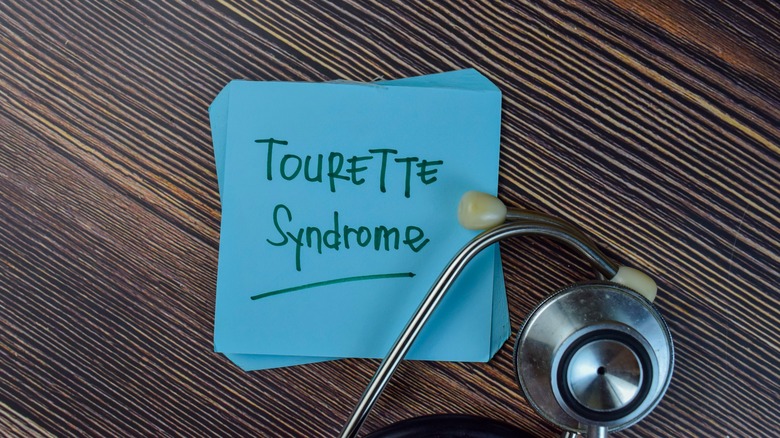Tourette's Syndrome Explained: Causes, Symptoms, And Treatments
Tourette's Syndrome (TS) is a neurological disorder that involves repetitive sounds and movements, called tics (per Mayo Clinic). Frequently associated with the use of profanity, people diagnosed with Tourette's Syndrome often experience social stigma, isolation, and problems fitting in with others because of their tics. Typically originating in childhood, Tourette's Syndrome can subside or lessen after the teenage years, but other people may continue to experience symptoms in adulthood.
First recorded in the 1880s by Georges Gilles de la Tourette, for whom the condition is named, the exact cause of Tourette's Syndrome is unknown, but it has been verified to be a neuropsychiatric condition, according to a 2011 study published in the Journal of Neuroscience. Symptoms begin before the age of 18, with an average onset of symptoms at the age of six. While it isn't known which specific part of the brain is responsible for the condition, it's believed that tics may be caused by variations in chemical levels of serotonin and dopamine in the brain.
Approximately 20% to 30% of children exhibit tics at some point for varying developmental reasons, but Tourette's Syndrome is a neurodevelopmental disorder that is diagnosed when tics are present for a certain length of time and become disruptive to a person's daily life. Here's what you should know about TS.
What causes it
The exact cause of Tourette's Syndrome is unknown since research on the condition is still in progress, but it's believed to be a result of family history and environmental factors (per Mayo Clinic). The neurological cause of TS might involve abnormal ways that the brain's neurotransmitters, including serotonin and dopamine, control nerve impulses.
According to the Centers for Disease Control and Prevention (CDC), scientists have found genetic links that have resulted in Tourette's Syndrome. Specifically, it's been discovered that a parent with a dominant gene for TS will have a 50% chance of passing it down to a child. If the gene is inherited, male children are more than three times more likely to express symptoms of the condition than are girls who inherit the gene.
Other research has determined that TS can be passed down in a manner that is genetically complex and that when it is inherited, certain environmental factors can exacerbate symptoms. Per Children's National Hospital, up to 15% of TS cases have a nongenetic cause. For example, babies born with a low birth weight or children who experience infections early in life may be more likely to develop TS, notes the CDC. Complications during pregnancy, as well as maternal habits like smoking while pregnant, may also make it more likely that a child will have TS symptoms. Some medications have been found to potentially cause symptoms of Tourette's Syndrome.
Signs and symptoms
The trademark symptom of Tourette's Syndrome is the presence of tics, which are uncontrollable, repetitive movements (via Mayo Clinic). Tics can be subtle or prominent. There are different types of tics, including vocal and motor. Vocal tics are noises or sounds that a person with TS makes, which can include grunting, barking, shouting, snorting, sniffling, tongue clicking, and saying words or phrases. Motor tics are physical movements such as jumping, jerking of the head, eye movements, winking, shrugging, snapping, clapping, and other movements of the body.
Tics are categorized into the categories of simple tics and complex tics. Simple tics are usually brief, repetitive, sudden movements or sounds involving a limited number of muscle groups, whereas complex tics are tics that are performed in repetitive patterns that are coordinated, marked, and use multiple muscle groups. People who have TS have both vocal and motor tics, but don't necessarily experience both simple and complex tics.
Many people associate Tourette's Syndrome with profanity, which actually falls within a subtype of tics called coprolalia and copropraxia (per Tourette Association of America). Coprolalia is the vocal form in which a person experiences involuntary outbursts of profanity or socially inappropriate words or statements. Copropraxia is the motor form where someone may have tics including obscene gestures or inappropriate touching of body parts. Even though these types of tics are among the most widely known symptoms of TS, only a small percentage of people diagnosed with TS experience coprolalia and/or copropraxia.
How it's diagnosed
When it comes to diagnosing Tourette's Syndrome, the condition is distinguished from other tic disorders because both motor and vocal tics must be present, says the Tourette Association of America. Per the DSM-5, the criteria for a diagnosis of TS include multiple vocal and motor tics that appear before the age of 18, tics that last for more than 12 months, and being able to rule out symptoms being due to medication or another medical condition.
If you suspect that you or your child have TS, it's advised that you consult with your doctor, who may encourage you to make an appointment with a neurologist, a medical doctor who specializes in the brain (per WebMD). Your doctor will probably ask about family history of tics and Tourette's Syndrome, the frequency and intensity of tics, the onset of symptoms, and whether you have anxiety or difficulty paying attention. Diagnostic testing including MRI and CT scans may be recommended to rule out any other brain conditions that can mimic symptoms of TS. If needed, you may be referred to another doctor or specialist.
Per WebMD, approximately half of people diagnosed with TS also exhibit symptoms of attention deficit hyperactivity disorder (ADHD) and struggle with completing tasks, maintaining attention, and sitting still. It's speculated that tics may disrupt attention and impact ability to finish tasks on time. The presence of symptoms of ADHD alongside symptoms of TS often allows for a diagnosis of both to be made.
Treatment options
There is no known specific treatment for Tourette's Syndrome, but there are several medications and counseling options that are effective in reducing the intensity and rate of tics, says WebMD. A specific type of behavior therapy called habit reversal training can help a person with TS learn how to recognize the oncoming of a tic and ways to mitigate the tic or stop it completely.
Medications that regulate chemicals in the brain, such as dopamine and serotonin, can decrease the presence of tics. Medications proven to be effective in controlling tics include haloperidol (Haldol), pimozide (Orap), and fluphenazine (Prolixin). High blood pressure medications like clonidine (Catapres) and guanfacine (Tenex, Intuniv) have also been found to treat tics.
Tourette's Syndrome is frequently present alongside other conditions, and a 2018 study published in Comprehensive Psychiatry concluded that comorbid conditions should be treated alongside TS in order to manage all symptoms. There are several conditions often diagnosed comorbidly with TS, which include obsessive-compulsive disorder (OCD), depression, attention deficit hyperactivity disorder (ADHD), anxiety disorders, learning disabilities, and pain from tics (per Mayo Clinic). According to WebMD, medications often prescribed to treat symptoms of OCD, depression, and anxiety alongside TS include sertraline (Zoloft), fluoxetine (Prozac), and other antidepressants.
Lifestyle management
Tourette's Syndrome is often present alongside other conditions, so treatment is often focused simultaneously on multiple diagnoses. People with TS often experience social challenges because of their tics, which can negatively impact self-image.
Talk therapy with a mental health clinician is often beneficial for learning how to manage daily life with Tourette's Syndrome, says WebMD. Habit-reversal training can help a person with TS mitigate tics. However, there is no sure-fire way to make tics go away completely, so finding ways to manage daily activities with the support of professionals, family, and friends is key. Because tics can become exacerbated when a person is feeling stressed, finding calming activities like reading, meditating, listening to music, or doing yoga can help lessen the intensity of tics.
Since TS can be a socially stigmatizing condition and mistaken for disruptive behavior, it's important to learn what to say to others to educate them on the condition. If your child has TS, WebMD recommends telling their school about it. The school may be able to provide support if needed.






